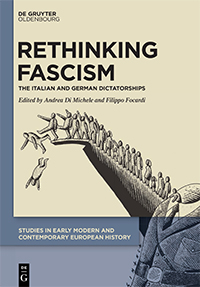Rethinking Fascism
The Italian and German Dictatorships
Andrea Di Michele, Filippo Focardi (edd)

Numero: 4
Editore: De Gruyter Oldenbourg
Città: Berlin/Boston
Anno: 2022
Cartaceo
Libro
This book takes up the stimuli of new international historiography, albeit focusing mainly on the two regimes that undoubtedly provided the model for Fascist movements in Europe, namely the Italian and the German. Starting with a historiographical assessment of the international situation, vis-à-vis studies on Fascism and National Socialism, and then concentrate on certain aspects that are essential to any study of the two dictatorships, namely the complex relationships with their respective societies, the fi gures of the two dictators and the role of violence. This volume reaches beyond the time-frame encompassing Fascism and National Socialism experiences, directing the attention also toward the period subsequent to their demise. This is done in two ways. On the one hand, the uncomfortable architectural legacy left by dictatorships to the democratic societies that came after the war are examined. On the other hand, the book addresses an issue that is very much alive both in the strictly historiographical and political science debate, that is to say, to what extent can the label of Fascism be used to identify political phenomena of these current times, such as movements and parties of the so-called populist and souverainist right.
Indice
Contents
Andrea Di Michele and Filippo Focardi
Introduction
I. Fascism and Nazism in a Transnational Key
Arnd Bauerkämper
German Historiography on National Socialism in Its Transnational Context
Roberta Pergher
Italian Fascism in Transnational Historiography
II. “Volksgemeinschaft” and the Relationship between Italian Society and Fascism
Frank Bajohr
From Debates on the Political Order to Visions of Community.
The Trajectories of Writing a Social History of National Socialism
Paul Corner
Beyond Consensus: Rethinking Italian Fascism
III. The Dictators: Hitler and Mussolini
Wolfgang Schieder
Adolf Hitler and Benito Mussolini. The Staging of a Political Friendship
Richard J.B. Bosworth
Benito Mussolini: 100 Years on
Gustavo Corni
Adolf Hitler
IV. Violence
Sybille Steinbacher
“Spaces” of Violence. Reflections on a Popular Concept in Holocaust Research
Amedeo Osti Guerrazzi
Fascist Violence. History and Historiography
V. Stone Fascism after the War
Albert A. Feiber and Thomas Schlemmer
Obersalzberg and the Axis.
State Visits between Idyll, Diplomacy, and Atrocity
Paolo Nicoloso
Traces of Fascist Architecture in Republican Italy
Andrea Di Michele
Fascist Monuments on the Border.
The Case of Bolzano/Bozen, South Tyrol
VI. The New Right and Fascism
Roger Griffin
“Sempre Presente?”. The Relevance of the Concept “Fascism” to Understanding Contemporary Socio-Political Realities
Marzia Ponso
Old Ideologies and New Strategies. German Right-Wing Populism
Matteo Albanese
CasaPound Italia and Forza Nuova. Back to the Future
Contributors
Parole chiave
- Fascism
- National Socialism
- Right-wing movements

